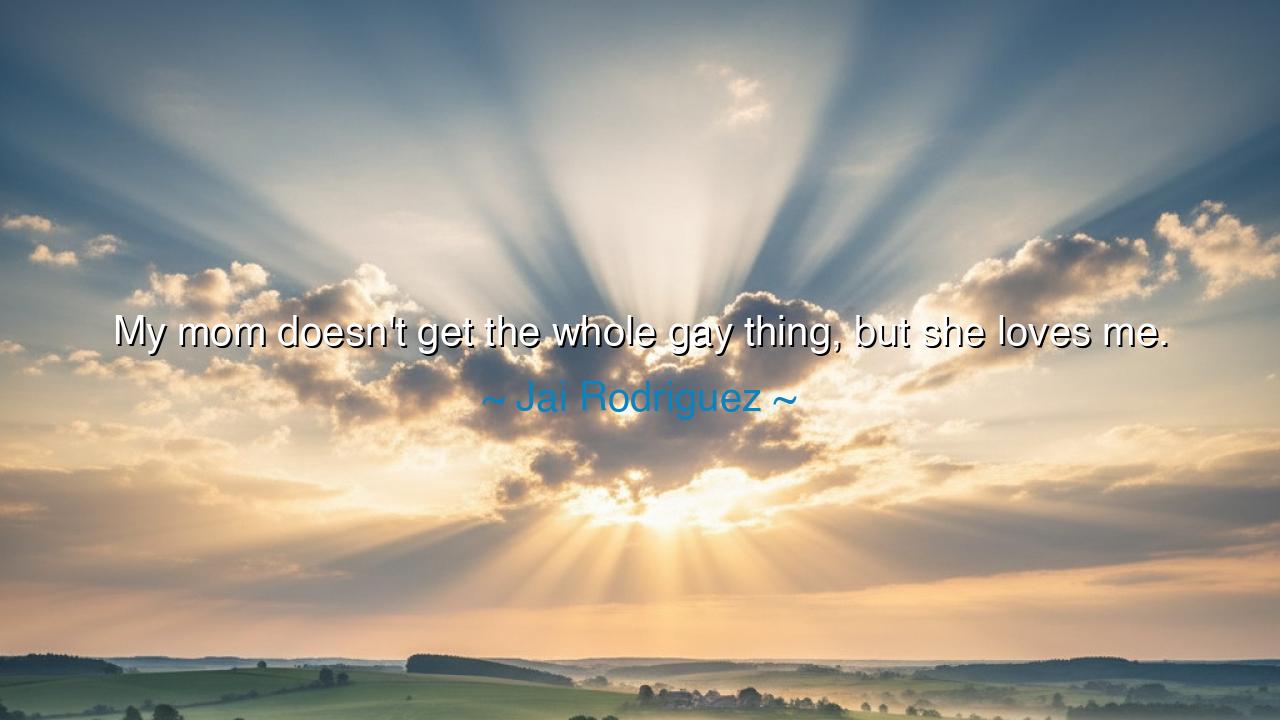
My mom doesn't get the whole gay thing, but she loves me.






“My mom doesn’t get the whole gay thing, but she loves me.” — thus spoke Jai Rodriguez, and in his words we find one of the most ancient truths of humankind: love may not always bring perfect understanding, but love can transcend it. The heart often knows what the mind cannot yet grasp, and in that tension we find both the pain of distance and the miracle of connection.
The mother in this saying is every parent who has stood bewildered before the mysteries of their child’s identity, unable to fully comprehend yet unwilling to withdraw their love. The child, in turn, is every soul who has longed not for approval of every detail, but for the enduring presence of affection. This is the root of the teaching: that love, even when imperfect, can serve as a bridge across the chasms of difference.
Think of the tale of Socrates, who stood accused before Athens, misunderstood by his fellow citizens. They did not “get” his philosophy, his questions, his insistence that truth must be sought through dialogue. Yet even as they condemned him, his disciples—Plato among them—remained by his side, bound not by agreement with every word, but by love and loyalty to the man himself. Misunderstanding and love can dwell together; and often it is love that endures when reason falters.
Jai’s words also carry the weight of history, for countless children have faced rejection when their truth was not “understood.” His mother’s response, however imperfect, reveals the higher path: to say, “I do not understand, but still, I love you.” In this is hidden a divine mystery: for love is often strongest when it chooses to stay without needing to comprehend.
But let us not deceive ourselves—this balance is not easy. To be gay, to be different, to live any truth outside the expected path, is to invite both misunderstanding and courage. Yet when love survives this test, it becomes a force stronger than knowledge itself. For knowledge may change, understanding may grow with time, but love—once chosen—remains steadfast.
The lesson is clear: seek to love even when you do not fully understand. Parents, children, friends, and strangers alike—do not wait for perfect comprehension before offering compassion. Love does not always need to “get it.” Love simply needs to remain. And in remaining, it becomes the soil in which deeper understanding can one day grow.
Practical action is needed. When faced with someone whose truth you do not yet grasp, do not close the door of your heart. Speak gently, listen more than you speak, and let your love declare: “I may not understand, but you will not lose me.” And if you are the one misunderstood, take courage—accept the gift of love even when it comes without full comprehension, for it is still a seed of hope, and with patience, it may blossom into true understanding.
Thus, the wisdom of Jai’s words resounds across generations: the world may not always “get” us, but if love remains, we are not alone. And in the end, love is the greater teacher, for it can carry us where understanding cannot yet reach.






AAdministratorAdministrator
Welcome, honored guests. Please leave a comment, we will respond soon